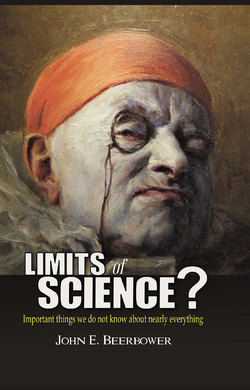Читать книгу Limits of Science? - John E. Beerbower - Страница 21
На сайте Литреса книга снята с продажи.
The Requirement of Falsifiability
ОглавлениеThere have been serious debates as to whether a theory that provides a sense or feeling of understanding is adequate to qualify as scientific or whether other criteria must also be met. Of course, the theory must be internally consistent (not lead to two conflicting predictions or conclusions). See, e.g., Alfred Tarski, Introduction to Logic (1946), pp.108–9. (More precisely, the axioms or initial premises must be logically consistent and the rules of manipulation must be constructed so as not to allow the introduction or creation of inconsistencies in the propositions derived from the axioms. See, e.g., Barrow, Theories of Everything, p.32.) And, there are often suggestions that certain aesthetic criteria be met concerning generality, simplicity and elegance.23
Probably the most frequent additional requirement for a scientific theory has been that the theory be testable by experimentation or observation. To start, a theory or hypothesis should enable one to make predictions about observable facts or events beyond the elements contained in the hypothesis itself. If one successfully observes the occurrence of such predicted consequences, then there is a basis for considering that hypothesis or theory to be supported.
One might consider that the successful predictions constitute a “verification” of the theory involved; but, during the second half of the twentieth century, the concept of verification or verifiability came under increasing attack as a matter of logic. The issue was not about how scientists engaged in the process of scientific discovery, but the philosophical issue of what was logically defensible.24
Verification by successful prediction has the same logical problems as inference by induction (or, for that matter, deduction): there are many reasons why a prediction might come true that are not supportive of the theory by which the prediction was made (coincidence, a common underlying cause, etc.). Generally, a successful empirical test will not provide substantial confirmation of the theory, because there are likely to be multiple alternative theories that could generate the same empirical prediction. This challenge to the concept of verification came about largely as a result of the writings of Sir Karl Popper.
Among philosophers of science (and, subsequently, generally among scientist who expressly address the issue), following the lead of Karl Popper, the testability of a theory has come to mean not that the theory can be confirmed by successful predictions, but that the theory is susceptible to being disproved by an imaginable and identifiable test or set of observations—in other words, that it is falsifiable. See Popper, The Logic of Scientific Discovery; Objective Knowledge: An Evolutionary Approach (1972). That means that the testing of a theory for the philosophers of science was formulated in terms of a possible experimental result that would be viewed as inconsistent with the theory and, if achieved, would demand that the theory be rejected. This may seem to be a rather odd concept of proof, and it had implications for the nature of the process of doing science.
